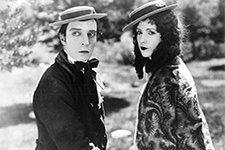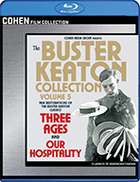Our Hospitality
|  Our Hospitality was Buster Keaton’s second feature-length film, following 20 one- and two-reelers he directed or co-directed between 1917 and 1923. His previous feature, Three Ages (1923), was an uneven comedy comprised of three different stories told in three different time periods, which made it a feature in name only because the three stories could easily have been separated out and turned into shorts (Keaton was inspired to spoof the structure of D.W. Griffith’s epic 1916 film Intolerance, but he also took note of the fact that, when Intolerance failed at the box office, they tried to recoup their money by separating two of the film’s four stories to create stand-alone features). The manner in which Keaton effectively hedged his bet with Three Ages suggests that he was not entirely confident in making the leap from two reels to six; the same could not be said for Our Hospitality. Set in the 1830s, Our Hospitality is a much more assured and mature work, not to mention a film that is decidedly more cinematic in its visuals. Similar to some of his earlier two-reelers, including The Paleface (1922), Keaton begins the film with straight melodrama—somber title cards, expressionistic lighting, and violent action to establish the background of the story, which centers on an extended, Hatfields-and-McCoys-esque feud between two Southern families. Keaton stars as Willie McKay, a young man who returns to claim his family property after being raised by his aunt in New York to protect him from the ongoing feud with the Canfields, whose paterfamilias, Joseph Canfield (Joe Roberts), killed his father when he was an infant. The feud is immediately complicated by the fact that Willie takes a liking to Joseph’s daughter, Virginia (Natalie Talmadge), and she to him, before they realize that they are on opposing sides of the feud. It’s too late, though, as Virginia has invited Willie to the Canfield house for dinner, where he realizes who they are (the first Canfield son has already figured out Willie’s identity, but isn’t able to convey the news before Virginia invites him for dinner). But, there is another catch, as Joseph insists that Willie can’t be killed by either of his handsome, trigger-happy sons (Francis X. Bushman Jr. and Craig Ward) while he is a guest in their home (God bless Southern hospitality!). Naturally, this makes Willie not want to leave the home of his sworn enemy, which leads to one of the film’s great comic sequences, as Willie moves in and out of the house with the Canfield sons ready to plug him the second he steps foot out the door.This middle section of the film is preceded by another elaborate comic setpiece involving Willie’s travel by train from New York. Keaton and co-director John G. Blystone (who essentially turned the production over to Keaton after only a week of filming) find great humor in the various and exaggerated absurdities of early rail travel, including the fact that the tracks are built right over rocks and fallen logs, producing a roller coaster effect at times. When they come across a stubborn donkey standing in the way, they just get out and drag the tracks around the incalcitrant animal. The train moves so slowly that Willie’s dog is able to keep up by running beneath it, and the engineer (played by Keaton’s father, Joe Keaton) is distracted enough that he doesn’t even realize when the train separates from the engine on a parallel set of tracks. All the while Willie is in a tiny, cramped car with Virginia, the minimal headroom of which gives him the excuse to exchange her period-appropriate top hat for his period-inappropriate (but official Buster Keaton) porkpie hat, a gag that clearly indicates just how familiar Keaton and his signature look was to audiences by the early 1920s.The film’s greatest sequence, though, involves Willie, Virginia, both Canfield sons, a boat, and a perilous waterfall. An early version of the classic Keaton trajectory gag—which he brought to perfection in films like Sherlock Jr. (1924) and Steamboat Bill Jr. (1928)—the waterfall sequence at one point finds Keaton, tethered by a rope tied to a log that is lodged in the rocks just above the waterfall, dangling perilously while Virginia is pulled down the river, not realizing what lies at the end. To say that Keaton saves her doesn’t give anything away, although the exhilarating stunt that allows him to save her just as she goes over is one of those things you just have to see for yourself.
Copyright © 2024 James Kendrick Thoughts? E-mail James Kendrick All images copyright © Cohen Media Group / Kino Lorber | |||||||||||||||||||||||||||||
Overall Rating: 


 (3.5)
(3.5)


